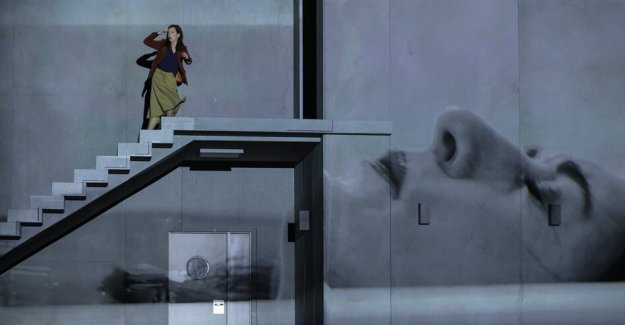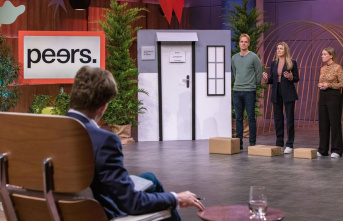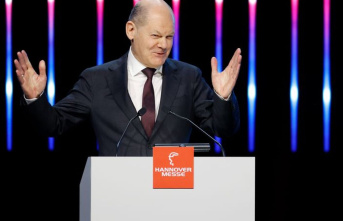premiere at the Deutsche Oper Berlin: "Heart Chamber" by Chaya Czernowin. A great Opera without all of that, what belongs to a great Opera.
Patrizia Ciofi on the stairs and dreaming photo: Trippel/Deutsche Oper in Berlin
It starts the Solo of an upright bass. Electronically amplified, as everything is here even to listen to, it opens an acoustic space, in the undoubtedly complicated, however, immediately perceptible laws apply. Uli Fussenegger, the soloist, exploring the possible sounds of his instrument. Zipping high harmonics, snare drum and cymbals at the end of the Deep, plucked, with the bow removed, or beaten, to layered clusters, sliding cascades.
It's probably insanely hard to play, but the pace is so slow that even the slightest touch of any part of this sound body is an event, and a nice. This is the only adjective that fits, everything else said too little. It's about beauty, not avant-garde, meaning, and aesthetic shocks target effects with sounds. The game with the Material of the sound is not an Experiment, it is completed in full.
Is it music? The solo piece to the ends of the Beginning in exactly two tones. It follows a prescribed Form, like everything else this evening, which is only 90 highly concentrated minutes. What is there not to are melodies, harmonies and rhythms. There are only pitch, over the whole audible range of sliding, there are layers of tones that sometimes sound like harmonious chords. But there are none, but only the temporary result of linear sequences of tones and their characteristic frequencies. You are progressing, pulsing, sometimes fast, sometimes slow, through silence or hard single strokes interrupted, a fixed rhythm this results in never.
this piece of Chaya Czernowin, 1956 has born Written in Haifa, now a Professor of composition at Harvard University in Boston, Massachusetts. If the has played the double bass to the end, opens the curtain for the stage by Director Claus Guth and set designer Christian Schmidt. In front of a black, white framed wall to the left, Patrizia Ciofi (soprano), Noa Frenkel (Alto), right with wide distance in between, Dietrich Henschel (baritone) and Terry Wey (Countertenor) sit.
"Heart Chamber" is the name of the plant. The Text has been written by the composer himself in the score integrated. In the subtitle it should be "To the inquiry about love", which is not the case entirely. About love and its equally tragic as comic dramas has been sung in the Opera, probably far from everything. But what is missing is the act of falling in love itself – also in psychology and philosophy. There is no Mavibet plot, more of an infection is, beautifully expressed with the metaphor "butterflies in the stomach". Happiness and anxiety are almost indistinguishable, we call us to order, to be and do it with a smile so stupid that we have to be ashamed of, actually. But for what?
We do not know, and that's what it's Czernowin, not about the love, about which we know almost everything. It is able to bring this notorious blind spot for the Sound, because your music can never be a perhaps even more dramatic, and tears touching expression of deep feelings. It is substantive and concrete. In the post-war avant-garde, there were also approaches, in the case of Stockhausen, in the case of Ligeti and Lachenmann. - Defining the formal ranks, and their dialectical opposite, the Aleatorism remained, however. For Czernowin is not interested at all, she is digging rather further and further down into the Depths of the clink of whatever, the voices, the instruments.
you heard everywhere in nature, not feeling. Minutes of the electronically revised Field buzzing of a bee swarm through the room. Specialists at the electronic studios of the SWR recorded the sound of individual leaves, and filtered. The result is a narkotisiernd endless pulsating Clatter, noise and Whisper, the responding voices to the singing, supported by a small soloists, choir, a chamber ensemble consisting of piano, drums, electric guitar, saxophone and full Symphony orchestra of the German Opera.
Johannes Kalitzke, composer is familiar with the Works of Chaya Czernowin very well and elicited the often bad-tempered ladies and gentlemen in a trench of wondrous sounds, which are prohibited otherwise: a sound at the bridge bowed Glissandi in the strings, mess nights and snot-blowers in all pitches. Claus Guth is smart enough to reduce the size of this universe to the concrete matter, not a psychological theatre of the Liebesleids. There is not even a name, just "you" and "He". Both, however, need two votes because of the inner conflict of falling in love would otherwise be possible. Fear, vulnerability, desire, expectation and happiness are superimposed so inextricable as the character in the score. They are all there and always audible.
The rotary stage shows on the back of the black wall a modern concrete Bungalow with open staircase. You and He meet, sing-speaking with one voice, thinking with others. Once the sentence "I love you even", but that is no climax, just a casual event, like everything else. Guth shows black-and-white Videos from streets and interior spaces, enlivened by couples and passers-by without a social abnormality, and close-UPS of bees, hands, faces. This is not good because it is as the optical backbone for an extreme music, explain anything, or want to understand. It brings the word to lots of confusion to the Sound that we know (hopefully) all. It is to Fall in love with. And great Opera also. Enthusiastic applause after the Premiere from Friday.
Date Of Update: 17 November 2019, 15:00











